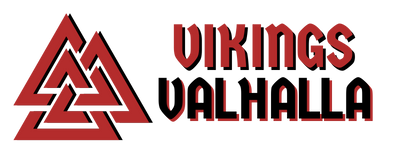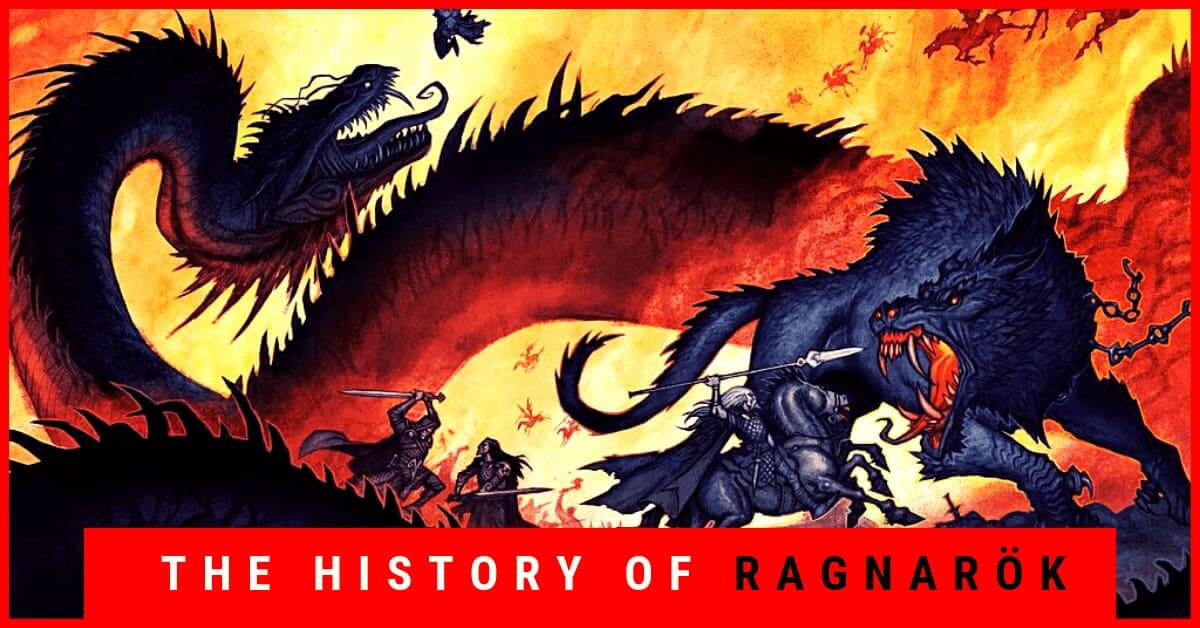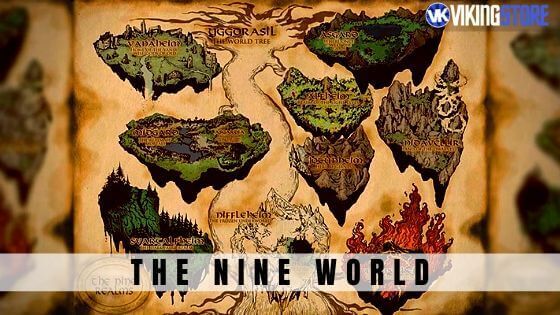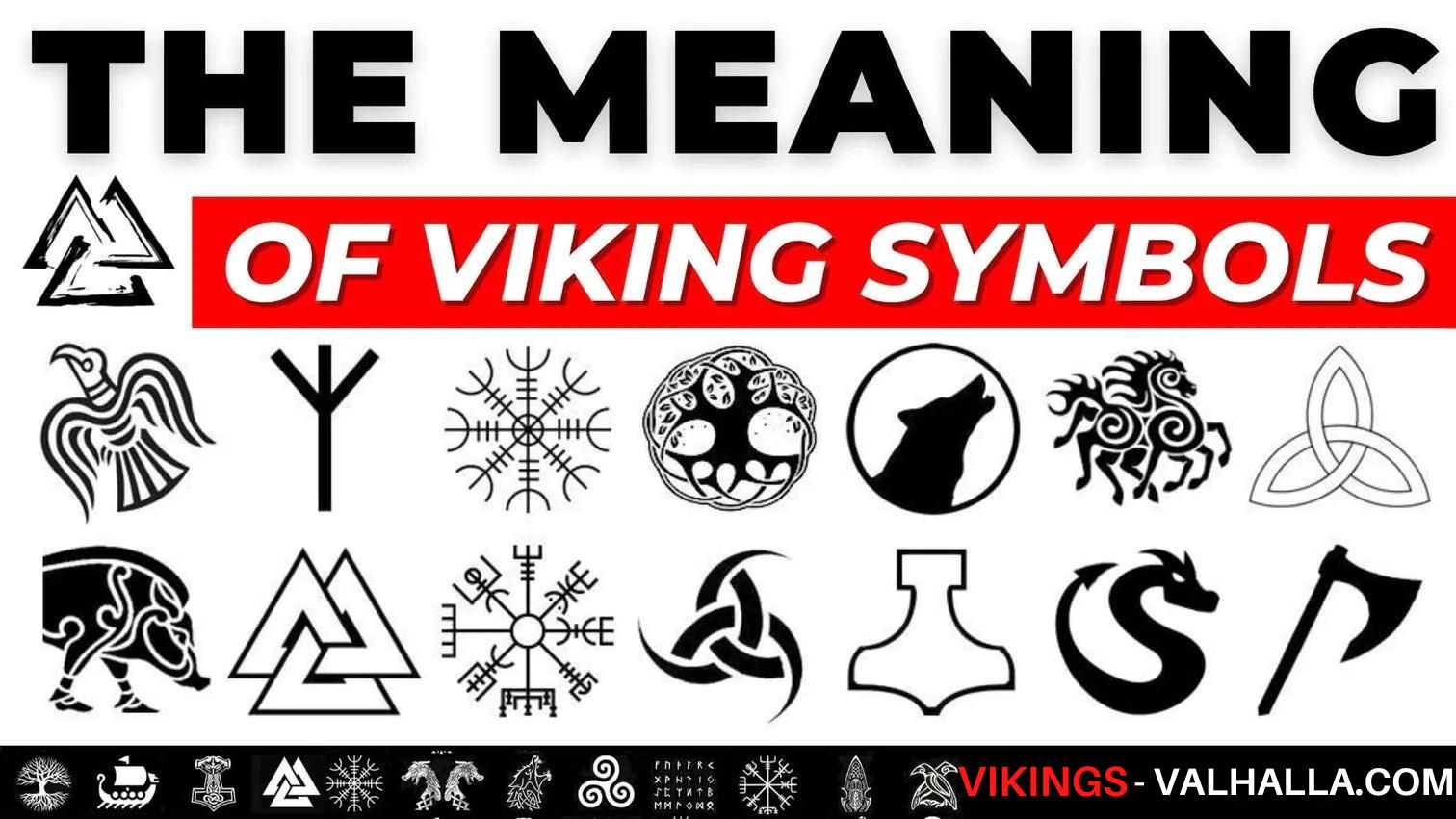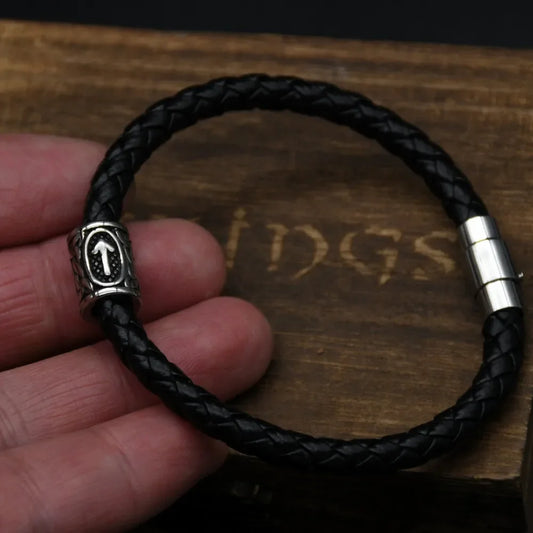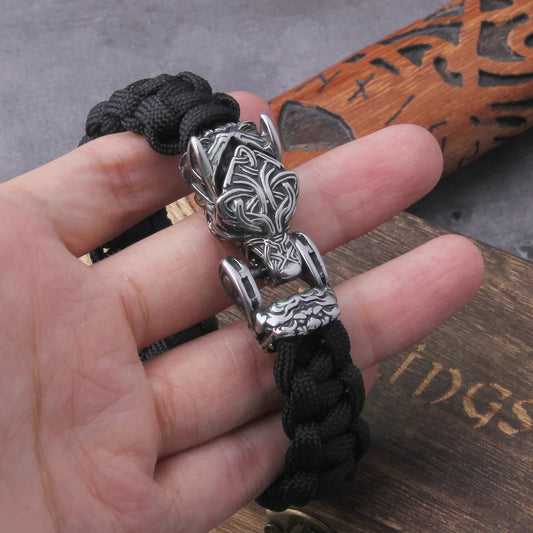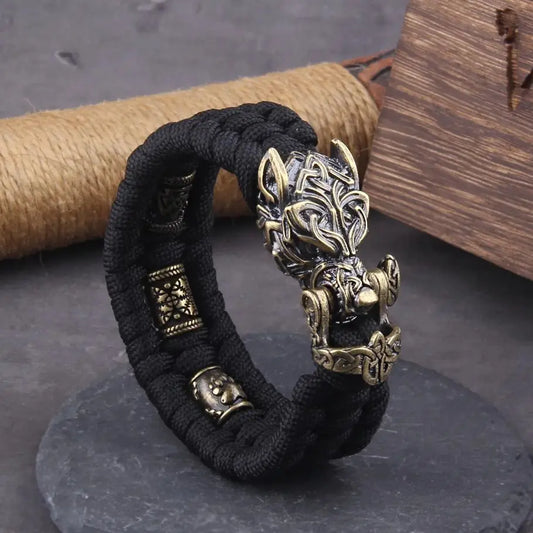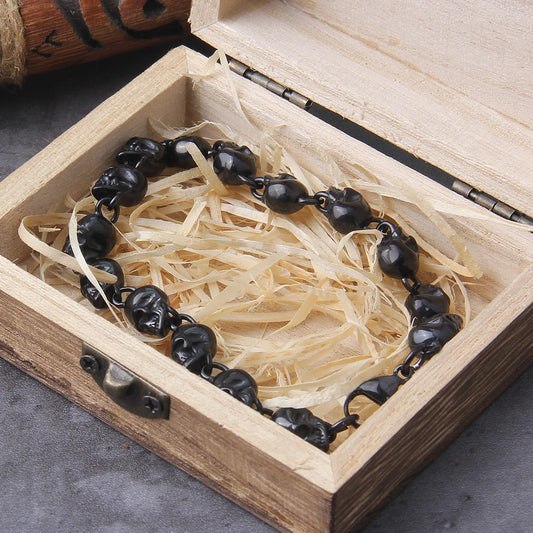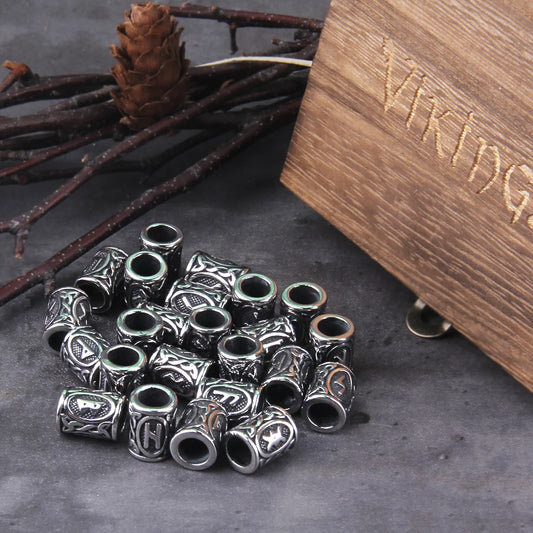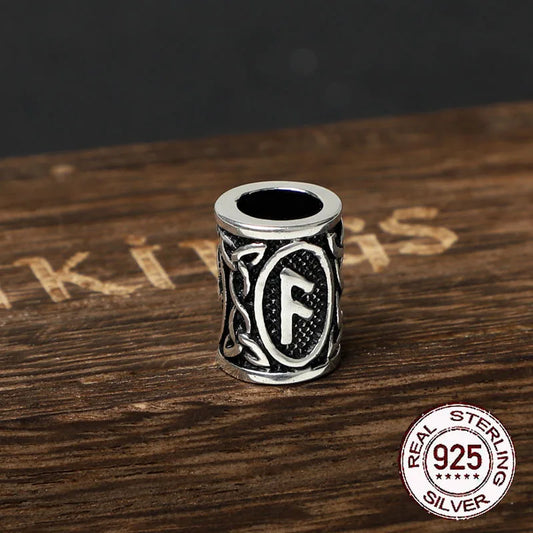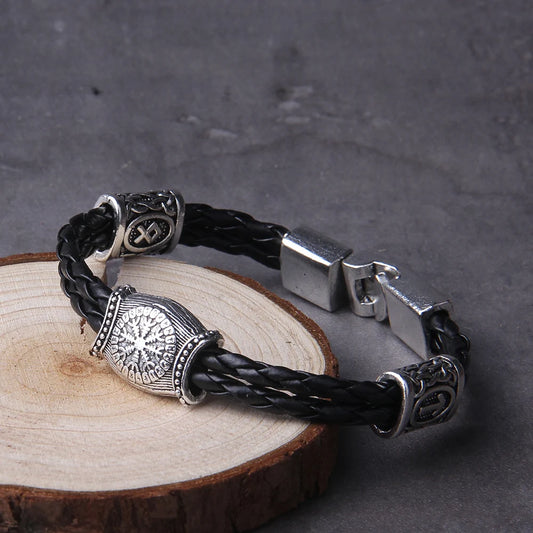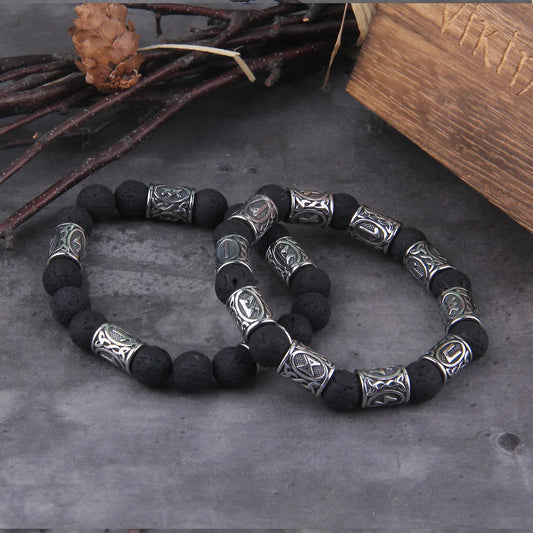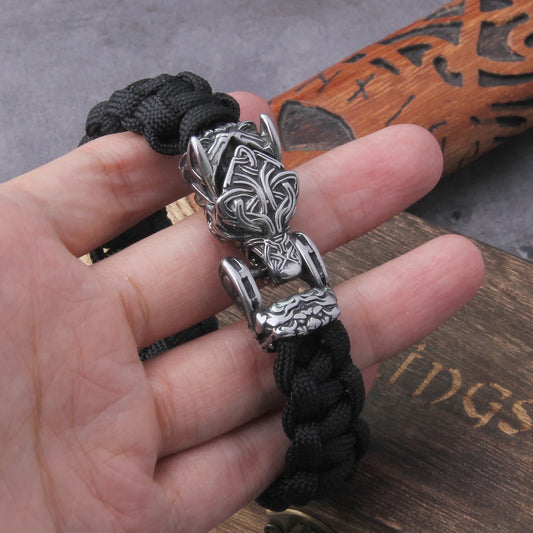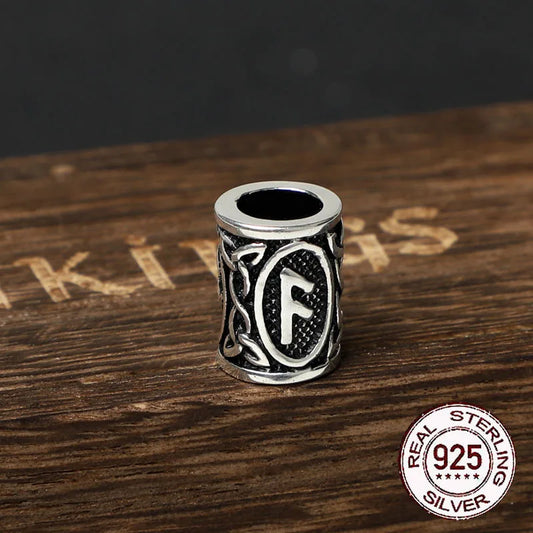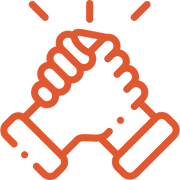Loki is a god belonging to Norse mythology. He is the son of the giants Farbauti and Laufey and has two brothers, Helblindi and Byleistr of whom little is known. In the eddas he is described as the "origin of all deceit" and mingled with the gods freely, coming to be regarded by Odin as their blood brother until the murder of Baldr. After this, the Aesir captured him and bound him to three rocks. According to the prophecy he will be freed from his bonds to fight against the gods in Ragnarök.
Despite much research, the figure of Loki remains in obscurity; there are no traces of a cult and his name does not appear in any toponymy. In religious terms, Loki is not a deity. Having no cult and no followers, no evidence or reference to it has been found, he is therefore more of a mythological being.
Since he can only be considered as a giant. At present, many neo-pagan groups that call themselves Lokeans worship him, which elevates him to the category of a minor god. However, they are opposed by many other established pagan groups such as the Folkish.
Some sources sometimes link him to the Aesir; but this is probably due to his close relationship with Odin and the amount of time he spent with the gods.
In the continental Scandinavian languages (Swedish, Norwegian and Danish) his name is Loke (pronounced "luke"). The composer Richard Wagner presented Loki under the Germanized name Loge in his opera Das Rheingold. There is a fire giant named Logi, which is why, due to its similarity in pronunciation, it is often confused with him and associated with fire.
According to some scholarly theories, Loki is conceived as the spirit of fire with all the potentially beneficial or harmful things it can be. However, it is possible that this view is a consequence of linguistic confusion with logi "fire," since there is very little indication of this in the myths, where Loki's role was primarily that of cunning counterpart or antagonist to Odin.
In fact, there is a story in Gylfaginning in Snorri's prosaic Edda where Loki competed against a jotun named Logi in a duel of ingesting food; and the latter loses, for when he finishes, Logi had not only eaten the meat but also the bones and the plate. They later discover that Logi is actually the personification of fire and had acquired his appearance using magic.
Loki's Origins
Some scholars argue that, as part of the triad of demiurges (Odin, Henir and Lodur, or Loki), this god was originally born of a generation of gods that predates Odin and was the son of the giant Imir, with his brothers Kari (air) and Hler (water) and sister Ran, the fearsome goddess of the sea.
Other mythologists, however, consider him the son of the giant Farbauti, who was associated with Bergelmir, the sole survivor of the flood, and the son of Lauweya (leafy island) or Nal (ship). In this case, the only thing that links Loki and Odin is the oath of twinning that the Scandinavians took to each other.
Loki's Family
Family
In addition to his marriage to Sigyn, Loki married the giantess Angrboda ("the bringer of woe"), who lived in the Iron Forest and bore him three children: Hel, the goddess of death, the Midgard serpent Jormungandr and the wolf Fenrir.
Sigyn bore him two sons, Nari and Vali, the latter named after the god who avenged Baldr. Sigyn was always faithful to her husband and did not betray him even after he was finally banished from Asgard and cast into the bowels of the earth.
The horse Sleipnir is also the son of Loki, whom he bore in the form of a mare from the horse Svadilfari.
Loki is also falsely attributed to his marriage to Glut (radiance), who was married to Logi and bore him two daughters, Eisa (coals) and Enmira (ashes).
Loki's Adventures
Loki occasionally collaborated with the other gods. For example, he tricked the giant who built the walls around Asgard without being paid for his work, by distracting the giant's horse by transforming into a mare in heat. In this way she became the 'mother' of Odin's eight-legged horse, named Sleipnir.
In another myth he makes the dwarves compete against each other in a test of skills. This led to the dwarves making Odin's spear, Gungnir, Freyr's ship, Skidbladnir and Sif's golden wig. He also rescued Idunn who had been kidnapped by the giant Þjazi. Finally in Þrymskviða, Loki manages, with Thor at his side, to retrieve the hammer Mjölnir after the giant Thrym stole it in order to ask Freya for a wife as an exchange (he literally had Thor disguise himself as a woman).
Although Loki was a big hassle for the gods as he caused the death of Baldr, the birth of Fenrir and other monsters that could eventually swallow the world. He provided them with the most precious items, from Thor's hammer to flying ships, and these tools were of great help in helping the gods defeat evil. He brings Ragnarök, but he also provides them with the means to overcome it.
In Lokasenna Loki recalls the pact of friendship he had with Odin, which is not mentioned in other sources, but which is very likely since on several occasions they undertook adventures together.
Loki and Baldr's Death
Baldr had nightmares in which he foretold his death and told the other gods about it. The goddess Frigg, his mother, traveled the world making all things pledge that they would never do any harm to her son. Hence, at the meetings in the Thing, the gods amused themselves by throwing objects at him, since they knew that none of them could hurt him.
However, on the other hand, they decided to capture and imprison Loki's sons because they were deemed to be dangerous. When Loki learned of this he was furious and went to speak to Frigg in the form of a woman, telling her what was happening in the Thing and asked her if she had made all things swear so that they would not harm Baldr.
Frigg remembered that he had not considered it necessary to make the mistletoe swear, considering it harmless. Loki knowing this, made a dart using a branch of mistletoe, then went to the Thing and tricked Baldr's blind brother, named Hodr, and made him throw the dart at him, thus killing Balder.
Hel, the ruler of the underworld, put as a condition to return Baldr, that all things mourn his death. The gods found a giantess called Thokk in a cave and begged her to shed tears in order to return Baldr.
The giant refused and was the only being who did not shed tears for the death of the god saying "let Hel keep what she has", thus preventing Baldr from returning from Helheim. The gods suspected that the giantess was actually Loki in disguise, which made them even more enraged.
Loki and Ragnarok
The gods filled with anger for the death of Baldr began to look for him and Loki took refuge in a mountain. There he built a house with four doors so that he could watch all directions. Sometimes during the day he transformed himself into a salmon and hid in the waterfalls of Fránangr. He thought of a way they could catch him and wove a fishing net of flax. When he saw that the Aesir were near, for Odin had sighted him from Hlidskjalf, he burned the net, transformed himself into a salmon and threw himself into the river.
The gods found Loki's house and seeing the ashes of the fishing net, began to weave one and headed for the river. There Loki evaded them by jumping over the net, but the gods split into two groups to catch him. When Loki was near the sea, he decided to take another risk and jump over the net, but this time Thor caught him by the tail.
They also caught the two sons he had with Sigyn, Nari and Váli (not to be confused with Vali, the son of Odin and Rind). The gods transformed Váli into a wolf who turned against his brother and killed him. They then used Nari's entrails to bind Loki to three blocks of stone, turned the bindings into iron, and Skadi placed a snake on his head so that its venom dripped onto his face. Sigyn sits beside him and collects the snake's venom in a wooden bowl, but when it is full she must throw the venom away, and in those moments the venom falls on Loki's face. The pain is so terrible that he writhes, causing earth to tremble. His punishment will last until the twilight of the gods.
The death of Baldr is an event that would precipitate the Ragnarök. Loki will be bound until that time. When Ragnarök finally comes, Loki will break free by shaking the earth. He will sail to Vigrid on a ship that also carries Hel and all the dwellers of Helheim along with with the wolf Fenrir and the serpent Jörmungandr. They will advance over the bridge of Bifröst and finally attack Asgard.
Once on the battlefield he will face Heimdall and neither will survive the encounter.
Loki in the Lokasenna
Lokasenna is one of the mythological poems of the poetic Edda. It relates a fierce dispute of Loki with the Aesir during a feast held by Aegir, the god of the sea. In the poem, many of the facets of Loki's evil, insight and treachery are exposed. Jealous of Aegir's servant, Fimafeng, for the praise he received for how well he treated the guests, Loki was enraged and killed him.
The gods threw him out of the feast, but he returned and began to insult them by mocking their shortcomings. By taking turns the gods tried to calm him down, as it was against the rules of hospitality to generate quarrels in the house of the host, but Loki continued and only fled when Thor drew his hammer, Mjölnir and threatened him.
The play ends with Loki's capture and captivity, although it does not explain that it was Baldr's death that was the cause for this; the latter is clearly mentioned in the prosaic Edda.
Some scholas suggest that there is the basis that assumes that Hodr killed Baldr out of jealousy of Nanna, which would distance Loki from the beginning of Ragnarök. This would demonstrate the ambiguity of the gods, who are close to men in human emotions and have intense feelings such as jealousy, and incite intrigues
Loki in the Loka Táttur
Not all folklore describes Loki as an evil being. An 18th-century ballad, probably derived from a much older Faroese source, entitled Loka Táttur, describes Loki as a friend of man. When a Thurs (troll or giant) kidnaps a farmer's son, the farmer and his wife pray to Odin to protect their son. Odin hides him in a wheat field, but the Thurs finds him. Odin rescues the son and returns him to the farm with his parents, saying that he has already hidden him.
The worried couple calls for Hoenir, who hides the farmer's son in the feathers of a swan's neck, but again the Thurs finds him. On the third day they beg Loki, who hides him among the flounder eggs. The Thurs finds him, but Loki had directed the boy to run to a dry dock.
The giant's head is trapped there and Loki kills him by cutting off his leg and inserting a stick and a stone into the stump to prevent it from regenerating. He then takes the boy and returns him to his home, where the farmer and his wife embrace them both.
Loki's "evil" is actually supposed to be only figurative, since the Norse do not consider him a villain, but rather an antagonist who brought hardship to Odin. It is believed that this vileness is imposed by the influence (rather than analogy) of a form of Manichaeism of the Christian religion through the writing of Snorri Sturlusson, so therefore Loki was not evil, but an ambiguous antagonist, when transcribed he was taken as "opposite to the main god". That is why he is mistakenly considered as evil, instead of ambiguous.
Influence of Loki in Popular Culture
Loki appears as the main villain in the Thor comic book from Marvel Comics. He also appears in all the Thor movies as the same villain and in The Avengers movie. In all of them he is played by Tom Hiddleston.
In the Supernatural TV series, the Archangel Gabriel descends to Earth after the fall of Lucifer. He himself claims to have undergone a makeover so that his brothers would not discover him; he takes the form of Loki to the rest of the pagan gods (he had a love affair with the goddess Kali), and of a Trickster to the Winchester brothers. Before falling dead at the hands of Lucifer, he was one of the most powerful beings in the series and caused the most "ridiculous" or "strange" problems to the protagonists, although his death was in part a necessary sacrifice for them to escape with Kali and learn to defeat his brother.
In the Stargate TV series, a scientist from the alien Asgard race named Loki was responsible for abducting humans from planet Earth to study them for a possible solution to the genetic race problem. In 1985 the High Council discovers him and strips him of his title, although as a rebel he continues with his research until he makes a mistake and is discovered by SG1 and denounced to Supreme Commander Thor.
The movie The Mask is about a mask that is actually the god Loki banished by Odin from Asgard and turned into a mask, causing whoever puts it on to acquire supernatural powers.
In the video game Smite, Loki appears as one of the playable characters and is represented as a stealthy assassin with deception skills.
In the Persona video game, he is the real Persona of Goro Akechi, who shows him in combat against him. In the Royal expansion with the new arc and Akechi's return to the group, Loki becomes the persona used by this character.
In the video game The Binding of Isaac, Loki appears as an enemy boss represented as a red demon.
In the video game Warframe, Loki makes his appearance as a warframe (a playable character) and is a stealth character.
On the moon Io, the closest moon to Jupiter is the Loki volcano, the most active volcano in the Solar System,
The volcano Laki or Lakagígar (Laki craters) is a volcanic fissure located in southern Iceland, near the Eldgjá canyon and the small town of Kirkjubæjarklaustur.
In the Kenichi manga, there is a group of martial artists called Ragnarok, the fourth fist of the group represents Loki.
In the anime Matantei Loki Ragnarok, the protagonist is the Norse god in the guise of a 12-year-old boy.
In the anime/manga Boku Girl the protagonist Suzushiro Mizuki is turned into a girl because of Loki's magic.
In the second Saint Seiya movie, The Great Battles of the Gods, Loki is one of the warrior gods of Asgard under the orders of Dolbar, the main enemy of this movie. In the series' spin-off, Saint Seiya Soul of Gold, Loki turns out to be the evil god behind the events that brought the 12 Golden Knights back to life in Asgard.
In Neil Gaiman's American Gods, Shadow is cellmates with a strange criminal named "Low Key Lyesmith," who is later revealed to be Loki.
An episode of Hercules (1998 TV series) features this god.
In the third season of the anime High School DxD Born this god appears as the main antagonist of the series.
In the video game God of War (2018), Atreus, the son of Kratos, is known as Loki, which gives birth to the mythical Norse god of mischief.
In the Yu-Gi-Oh! franchise, "Loki, Lord of the Aesir" (whose original name is "Polar God Emperor Loki") is one of the available printed cards. In the Yu-Gi-Oh! 5D's anime series, it is used by Broder (whose original name is Brave), a member of Team Ragnarok.
In the anime/manga Shūmatsu no Valkyrie, Loki appears as the god of deception and is also one of the fighters who will fight in Ragnarök representing the gods.
In the short novel Loki: Story of a Changeling, by Manuel Escutia, the life of the god of deception is discussed, taking into account the different versions of mythology.
